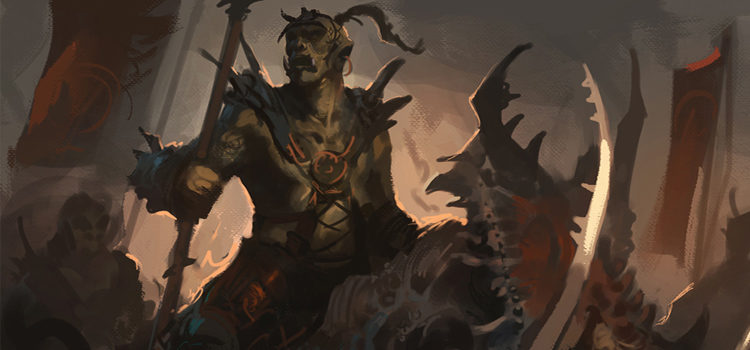College Of Lore Bard Guide: D&D 5e Build Ideas + Tips
This post may contain affiliate links. If you buy something we may get a small commission at no extra cost to you. (Learn more).
Ah, the classic bard subclass.
Bards of the College of Lore are all about knowledge. They pick up tidbits of information wherever they go, from the most illustrious libraries to the most rustic taverns. This college from the Player’s Handbook is simple but powerful; you gain extra proficiencies, the ability to turn enemy hits into misses, early access to spells from other classes, and even the opportunity to use Bardic Inspiration on yourself.
It doesn’t offer as many roleplay cues as the other bard subclasses.
But this openness is an opportunity for you to add the flavor and really make it your own.
If you’ve chosen the College of Lore, this guide will help you optimize this incredible bard subclass while offering pointers for roleplay too.
Bonus Proficiencies
This feature ensures that you’ll have proficiency in a minimum of eight of the 18 skills available (two from your background, three from this class if you started as a bard, and three from Bonus Proficiencies).
The exact wording of the feature is:
When you join the College of Lore at 3rd Level, you gain proficiency with three skills of your choice.
—Player’s Handbook
Maximizing Bonus Proficiencies
That’s it, that’s the feature!
You have the flexibility to choose any three skills you like.
There are a couple of ways you can approach this:
The first is from a character perspective, and the second is from a party utility standpoint. I’ll discuss the party utility aspect here, and the character piece in the roleplay section (coming up after this).
As far as party utility is concerned, you can play to your strengths and get the most out of these new proficiencies by choosing Charisma or Dexterity-based skills, since these will be your highest stats if you’re optimizing your build.
Most bards choose Persuasion and/or Deception and Performance when they start out. So if you want to round that out with Intimidation as well, go for it.
Having proficiency in Acrobatics can also come in handy if you need to escape a grapple. So take that if you haven’t already got it. Stealth is another good option if your party does a lot of sneaking around in places you’re not supposed to be.
Alternatively, you can also check with your party and see if there are any glaring skill proficiencies missing from your group and pick those up so you have all bases covered.
Bonus Proficiencies maximizes the bard’s versatility, and you can fill any role with it.
Remember that at this level you also get Expertise as a bard class feature. So you can pick up a new skill here and choose to double your proficiency bonus with it, if you like.
Additionally, you should always be looking to max out your Charisma score because it means more uses of Bardic Inspiration. But it also means that you’ll have the maximum possible bonuses to your Charisma skills, if you choose to put your Expertise there.
Bonus Proficiencies Roleplay Tips
If you’d rather choose your new proficiencies based on the skills your character is likely to have (because of their backstory or story experience so far), then you can do that!
If there were skills that you wanted to give your character a proficiency in when you first created them, but didn’t have room, now’s your chance to pick them up.
If it’s a skill tied to your backstory, you can roleplay becoming proficient in it. Perhaps you haven’t had to use that skill in a while and you were a bit rusty, but now you’ve gotten back into the swing of things and you’ve remembered your old techniques.
It can also be a lot of fun to choose new proficiencies based on your adventure so far. And it’s very much in line with the knowledge theme of this subclass.
If you’re having trouble thinking of reasons why you might take a particular skill, check out this list of ideas below:
Athletics. You’ve been climbing or hiking or doing other physically demanding tasks and have become stronger in the process. Take proficiency in Athletics.
Acrobatics. You’ve been working on a new performance routine, or you’ve had to get yourself out of tricky situations and you’ve found that you’re more flexible than you thought. Take proficiency in Acrobatics.
Animal Handling. You’ve had to tame a few wild animals on your journey, or perhaps you sat at the front of a cart while it was being driven and you got a first-hand look at how to handle animals. Take proficiency in animal handling.
Arcana. You’ve encountered a few magic items and you’ve learned more about how they work. You might have cast identify a lot or witnessed someone else doing it. Take proficiency in Arcana.
Deception. You’ve had to lie your way out of sticky situations. As a bard, you spin a convincing tale and people are none the wiser. Take proficiency in Deception.
History. You like to know the history of every place you visit, and you always go looking for as much information as you can find. Take proficiency in History.
Insight. You’ve spent some time observing people and finding out what makes them tick. You now have a knack for reading body language and picking up subtle cues that reveal the truth. Take proficiency in Insight.
Intimidation.
Nature. You’ve been trekking through a forest or other terrain for some time, and you’ve learned a thing or two about the natural world along the way. Take proficiency in Nature.
Medicine. As you and your party have been fighting, you’ve had to send to a few injuries, perhaps even your own. You might’ve also encountered an illness or two. Take proficiency in Medicine.
Perception. You’re observant and have become adept at using all your senses to perceive the world around you. Take proficiency in Perception.
Performance. As you’ve travelled, you’ve performed at all kinds of venues and you’ve gained some experience. Take proficiency in Performance.
Persuasion. You’ve managed to talk your way into being allowed to do all sorts of things and you’ve come up with some airtight reasoning. Take proficiency in Persuasion.
Religion. You’ve been hanging out at temples and you’ve witnessed some religious services take place. You might even have had the chance to speak to a priest or cleric. Take proficiency in Religion.
Sleight of Hand. You’ve had to rely on legerdemain to hide objects or to take things without people noticing and you’ve had enough practice to actually be quite good at it. Take proficiency in Sleight of Hand.
Stealth. All that sneaking around in secret has done you good. Take proficiency in Stealth.
Survival. You’ve adventured through hostile terrain and tracked down fearsome creatures, avoided natural hazards and you’ve learned more about how to navigate these things. Take proficiency in Survival.
These are just some examples of how you can tie your new proficiencies to your character’s story experience.
And it’s a great way to roleplay getting your Bonus Proficiencies, rather than just announcing that you’ve picked up this feature.
Cutting Words
I love Cutting Words.
It’s an iconic College of Lore ability, and its reputation is well-deserved. Just incredibly useful and can be the difference between life and death—either for you or for an ally.
Here’s what you get with it:
Also at 3rd Level, you learn how to use your wit to distract, confuse, and otherwise sap the confidence and competence of others. When a creature that you can see within 60 feet of you makes an attack roll, an ability check, or a damage roll, you can use your reaction to expend one of your uses of Bardic Inspiration, rolling a Bardic Inspiration die and subtracting the number rolled from the creature’s roll. You can choose to use this feature after the creature makes its roll, but before the DM determines whether the attack roll or ability check succeeds or fails, or before the creature deals its damage. The creature is immune if it can’t hear you or if it’s immune to being charmed.
—Player’s Handbook
Maximizing Cutting Words
Cutting Words is incredibly useful in a fight.
It can be tempting to use it every round, but I’d recommend saving it for when an attack only just hits your ally.
Deploying it under these circumstances increases your chances of changing the outcome of the roll.
Usually it’s not worth spending Bardic Inspiration to reduce an enemy’s damage roll.
But Cutting Words works for area of effect spells that require a damage roll, so if your party is low on hit points and a spellcaster throws a fireball your way, you can use Cutting Words and it’ll reduce the damage taken by each target.
It’s not quite as good to use it here, but in this specific circumstance, it just might save your party from falling unconscious.
Since this ability also works for enemy skill checks, you can use it to help prevent enemies from successfully Shoving you or a party member.
Outside of combat situations, you’ll want to use it sparingly and only for important skill checks.
If your roll is contested and you roll well, but you suspect that your enemy might have a bonus to its ability check, you could try using Cutting Words there.
Cutting Words Roleplay Tips
Per the feature’s description, “you learn how to use your wit to distract, confuse, and otherwise sap the confidence and competence of others.”
The easiest way to roleplay this feature is to describe how you do those things.
If you’re stumped for ideas, here are some:
Distract
- Ask the enemy an existential question such as “Have you ever thought of the possibility that we’re all just figments of someone’s imagination and we’re not really here?” and make them momentarily forget what they’re doing.
- Make a terrible pun and distract the enemy with your awful wordplay.
- Ask if they’ve heard a particular story that you know, and then proceed to tell it. If you can’t think of one, use the tale of Darth Plagues the Wise.
Confuse
- Tell the enemy something completely nonsensical, like how you’re so glad that the word “tentacle” rhymes with the word “orange” because it’s raining today.
- Just start talking to the enemy: ask them how their day has been so far and about how their family is doing. That’ll throw them off.
- Compliment the enemy and say something nice about their appearance or technique. This is extremely confusing, especially if you’re fighting them.
Sap confidence and competence
- Insult the enemy. If you can’t think of a good insult, there are some fun insult generators available online. If you’d prefer something original, insult their outfit or choice of weapon, or tell them that they’re bad at their job.
- Mock the enemy. Do an impression of them, or repeat back something that they said but exaggerating their voice and mannerisms.
Additional Magical Secrets
This ability is very handy, and you get it four levels earlier than other bards.
You can choose two spells from any spell list and the options are near endless.
Here’s the exact wording of your new ability:
At 6th level, you learn two spells of your choice from any class. A spell you choose must be of a level you can cast, as shown on the Bard table, or a cantrip.
The chosen spells count as Bard spells for you but don’t count against the number of Bard spells you know.—Player’s Handbook
Maximizing Additional Magical Secrets
Whew there’s a lot of spells to choose from. Literally, every spell ever!
The entire spellcasting world is your oyster. You can pick any spells you like.
How you maximize this is really in your hands.
It depends on what you want to do with your role. If your party is missing something obvious: for instance, if you’re the only arcane caster in the party then you’ve likely already been filling in for a wizard. And you might want to consider taking your spells from the wizard list.
Having said that, you don’t have to build for your party—these can be your spells and they can suit your character’s interests and motivations. Here are some possible ideas:
Make an animal friend. If your character would like an animal companion, find familiar and find steed are both accessible to you at this point.
Deal some damage. If you find yourself looking at the party barbarian with envy during combat, consider picking up some blasting spells. Bards don’t get a lot of heavy damage-dealing spells, so consider dishing it to your enemies with fireball or lightning bolt.
Control the battlefield. Never underestimate the power of battlefield control. If you’re going dungeon delving and are spending a lot of time in narrow corridors, entangle or web might be good options.
React defensively. It’s extremely common for Lore bards to take counterspell at this stage, and with good reason: it’s a very powerful spell that might just save your life. It doesn’t matter if another person in your party has it already; you can never have too many counterspells, in my opinion. In addition, you might want a defensive spell like shield or absorb elements.
Be a better healer. If you want more options for healing/lifesaving, consider aura of vitality or healing spirit.
Protect yourself. If you’re looking for more warding buffs, you might want to add protection from evil and good, protection from energy or protection from poison to your repertoire.
As a true College of Lore bard should, I’d recommend doing your research and doing it thoroughly. Since you cannot replace the magical secrets you learn through this feature with spells from other spell lists later.
You can, however, pick more spells from other spell lists at levels 10, 14, and 18.
Magical Secrets Roleplay Tips
If you like, you can roleplay how you found and learned the new spells.
Here are some questions you can ask yourself to figure out how your character will act when talking about it:
- How did you find out about these spells? Did you read about them in a book, or did you hear a story about another spellcaster who used them?
- What drew you to these particular spells? How do they complement your current knowledge of magic?
- Were they hard to learn? How did you study and practice?
- How will you make them yours? What does it look like when you are casting them?
- What interests of yours are reflected in your choice of spells? Do you think you will pick thematically similar spells in the future?
- How do these spells further your progress toward your overall goals as a character?
Peerless Skill
You’re amazing.
You’re so accomplished and you’re so lore-ful that you can use Bardic Inspiration on yourself!
This feature lives up to its name and really maximizes the bard’s utility and flexibility. Here’s what you get exactly:
Starting at 14th level, when you make an ability check, you can expend one use of Bardic Inspiration. Roll a Bardic Inspiration die and add the number rolled to your ability check. You can choose to do so after you roll the die for the ability check, but before the DM tells you whether you succeed or fail.
—Player’s Handbook
Maximizing Peerless Skill
At this point, your Bardic Inspiration die is a d10, which can be a sizeable improvement to a narrowly failed skill check.
Use it for important ability checks—things that are crucial to the plot, or that would be otherwise difficult to achieve without succeeding on the skill check.
You should either use it when you think you’ve failed an important skill check by a small enough amount that you can buff it with Peerless Skill, or if you want to combine it with Expertise and get an even bigger bonus to skills that you’re already great at.
It’s all too tempting to want to use this feature on multiple ability checks. But be discerning with it, otherwise it’ll eat up your Bardic Inspiration quickly.
Either that, or ensure you can finish a short rest once you’ve expended all your uses.
While this ability is strictly for ability checks, that doesn’t mean you can’t use it in combat at all.
Don’t forget that an Initiative roll is an ability check. Casting counterspell or dispel magic can also involve an ability check so keep a die or two handy for these.
Peerless Skill Roleplay Tips
The gist of this feature is that you’re good—no, AMAZING—at doing things.
The name of the ability comes from the idea that you could make these skill checks on your own, without the support of other party members.
Sure, it can help if you have a party cleric who remembers to cast guidance on you before you make a skill check. But you don’t need it.
Your skills are unrivalled because you’ve got that College of Lore knowledge.
It’s easy to roleplay being amazing at ability checks that you’re expected to be good at, such as Charisma-based skills; your party has likely seen you smooth-talk your way out of trouble (and into it, too) many times.
They know how charming you can be.
In terms of skills that your party is less likely to assume you’re good at, you can remind them of times in the campaign where you’ve learned something related to that skill. It can make for a nice moment of nostalgia, and is a great way to cement your authority.
You could also play it off from the Bardic Inspiration angle; you attempt a skill check and you inspire yourself! You remember that you’re great and that you’re competent and that you’ve got this, and you roll that extra d10.
Or maybe you hum a tune and it gives you a morale boost that you use to add the bonus to your ability check.
College of Lore: A Note on Ability Scores
I haven’t really discussed ability scores in this guide.
A lot of the bard’s abilities are tied to your Charisma score. And if you want to maximize your bard, this score should be your priority.
Of course, there’s no rule saying that you have to optimize your character. So feel free to ignore these recommendations.
But if you do want an optimized build, here’s how you should assign your ability scores (from highest to lowest):
Charisma. This stat is everything for a bard. You’re the “face” of the party and your class features rely on it. Make it a priority to get this to 20.
Dexterity. Dexterity is a useful ability for the bard, not to mention that you’re already proficient in Dexterity saving throws, so it’s logical to maximize that.
Constitution. Although there are no specific skill checks associated with Constitution, your concentration saves and hit points depend on it.
Wisdom. Wisdom saves against magic and other mind-altering effects are common and the consequences of a failed Wisdom save can be quite nasty.
Intelligence. You can choose to rank this one higher than Wisdom if you like, but you have spells that you can use to handle things like Arcana checks.
Strength. Complete dump stat for the bard. If you’re using finesse weapons in combat, you can use Dexterity for those instead.






